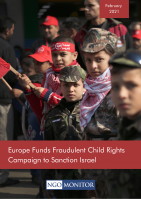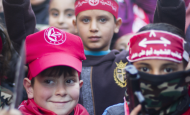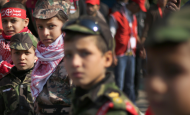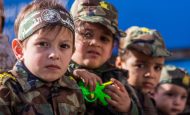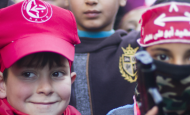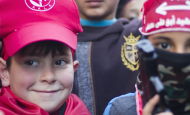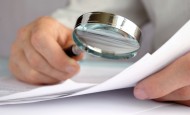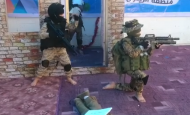Europe Funds Fraudulent Child Rights Campaign to Sanction Israel
Executive Summary
- Palestinian and international NGOs – funded by European governments and working in tandem with UNICEF’s West Bank and Gaza branch – have built an extensive campaign, using false charges of abuse of Palestinian children in the effort to trigger sanctions against Israel.
- A core goal is to have the IDF included on a list of child rights abusers, published annually by the UN Secretary-General. This NGO network also lobbies the International Criminal Court (ICC) and pressure governments, including the US Congress, to enact sanctions against Israel.
- Since 2018 alone, the EU has provided at least €3.2 million to projects that advance the campaign, alongside at least $6.7 million from European countries (UK, Norway, Belgium, Switzerland, and others) and UN frameworks.
- For 2018-2022, UNICEF requested $3.35 million to engage “human rights mechanisms…to hold Israel accountable for its obligations under international law” – a reference to pushing for sanctions against Israel – and to increase the capacity of NGO advocacy against Israel.
- UNICEF no longer publishes a list of its NGO partners – reflecting a lack of transparency, perhaps in response to NGO Monitor research. As of September 2017, NGOs on the UNICEF “Working Group” included: Defense for Children International – Palestine (DCI-P), Palestinian Centre for Human Rights (PCHR), Al Mezan, B’Tselem, Terre Des Homme – Suisse, Save the Children, War Child Holland, World Vision, OCHA, UNESCO, UNRWA, UN Mine Action Service (UNMAS), and WHO.
- Several of these NGOs promote BDS and other forms of political warfare against Israel, and a number are closely linked to the Popular Front for the Liberation of Palestine (PFLP).
- NGO Monitor has produced detailed research reports documenting the baseless NGO allegations relating to Israel’s treatment of children. NGO publications are often based on invented standards, distortions of international law, invented and inconsistent standards, and unreliable data collected by terror-linked and BDS-supporting actors, and reflect a marked lack of familiarity with Israeli practice.
- NGO Monitor recommends that donor states, international organizations, and UN agencies including UNICEF immediately cease all funding to and cooperation with NGOs that have ties to the PFLP or that engage in BDS and other anti-Israel political activities.
- International donors should review all funding to UNICEF projects to guarantee that funds are not being distributed to NGOs with ties to terrorist organizations. They should also develop and implement robust funding guidelines to ensure that funds are not provided to groups with ties to terrorism or that promote violent rhetoric or antisemitism.
Introduction
Palestinian and international NGOs – funded by European governments and working in tandem with UNICEF’s West Bank and Gaza branch (UNICEF-oPt) – have built an extensive campaign, using false charges of abuse of Palestinian children in the effort to trigger sanctions against Israel. A core goal is to have the IDF included on a list of child rights abusers, published annually by the UN Secretary-General as an annex to the report on Children and Armed Conflict (CAAC).
The NGO also exploit such claims to lobby the International Criminal Court (ICC) to prosecute Israelis, employing terms such as “widespread and systematic abuse” to artificially echo the definition of crimes against humanity in the ICC’s Rome Statute. Similarly, NGOs pressure governments to enact sanctions against Israel. For instance, based on manufactured allegations, the “No Way to Treat a Child” advocacy project – spearheaded by the terror-linked Defense for Children International-Palestine (DCI-P)1 and American Friends Service Committee (AFSC) – led to the introduction of congressional legislation to curb US funding for Israel.
In January 2018, NGO Monitor published “UNICEF and its NGO Working Group: Failing Children,” detailing joint NGO-UN efforts to demonize Israel and blacklist the IDF. We noted that several of the NGOs in this “Working Group” promote BDS, and a number of members are closely linked to the Popular Front for the Liberation of Palestine (PFLP) – designated as a terrorist organization by the US, EU, Canada, and Israel (see Appendix I).2 Since then, as detailed below, NGOs have continued their efforts, under UN auspices and buoyed by substantial financial and project support from the EU and European countries (see Appendix II).
According to the “United Nations Development Assistance Framework State of Palestine 2018-2022” report, UNICEF sought $3.35 million over that period to engage “human rights mechanisms…to hold Israel accountable for its obligations under international law” – a reference to pushing for sanctions against Israel. Activities include “documenting and reporting on grave violations of child rights”; “building capacity of the government and civil society on data collection, reporting, analysis and advocacy related to rights & violations”; and increasing the “number of national, civil society and other organizations actively monitoring, advocating and mobilizing on human rights violations” (emphases added).
At the same time, since 2018 alone, the EU has provided at least €3.2 million to projects that further the campaign, alongside at least $6.7 million from other European countries and UN frameworks. NGOs that receive this funding continue to accuse Israel of violations against Palestinian children, often inventing legal doctrines and standards in order to do so.
NGO grantees also engage in advocacy and lobbying, targeting the US Congress, UN bodies and other international actors, and a variety of European institutions. Many of the grants – including from individual European countries such as the UK, Norway, and Belgium – explicitly include advocacy benchmarks such as the number of press briefings held, meetings conducted, and reports issued (see Appendix II).
NGO Monitor has produced detailed research reports documenting the baseless charges in publications related to the children campaign. NGO allegations are often based on invented standards, distortions of international law, unreliable sources collected by terror-linked and BDS-supporting actors; they reflect a marked lack of familiarity with actual Israeli practice. However, gauging Israeli policies and action by recognized metrics and reliable data would not justify the NGOs calls for sanctions.
Moreover, NGOs routinely ignore the context of Palestinian incitement and the involvement of Palestinian minors in violence against Israelis, as well as the recruitment and use of children by Palestinian terrorist organizations.
Background: UN Secretary-General’s list of child abusers
Since 2001, the UN Secretary-General has published a yearly report on “Children and Armed Conflict,” including an annex listing “parties to armed conflict” that engage in “grave violations” that fundamentally breach the rights of children.3 The declared purpose of the annex is to focus the “Security Council on specific parties, whether states or non-state actors” and take “targeted measures against violators, including the possibility of sanctions” (emphasis added). To date, the annex almost entirely consists of failed states, state-sponsored militias, and terrorist organizations such as ISIS, Boko Haram, the Taliban, and Al-Qaeda.
The five “grave violations” that trigger inclusion in this annex are4:
- Killing or maiming of children
- Recruitment or use of children by armed forces or armed groups
- Attacks on schools or hospital
- Rape or other sexual violence against children
- Abduction of children
Inclusion in the annex – and only inclusion in the annex, as distinct from the body of the report – automatically triggers the application of the UN’s monitoring and reporting mechanism (MRM), whereby UNICEF is tasked with collecting verifiable data on grave violations and reporting to the Secretary-General. Since no party in Israel, the West Bank, or Gaza is listed in the Secretary-General’s Annex, there is no MRM in place, and UNICEF does not have a mandate to monitor and report on Israel.
Although the IDF has not been listed despite intensive efforts, NGO advocacy has succeeded in influencing UN officials. In July 2019, UN Special Representative of the Secretary-General for Children and Armed Conflict (SRSG) Virginia Gamba de Potgieter, held a lengthy press conference in which she entertained the possibility that the IDF would be added to the annex.5 And in his 2019 report on children and armed conflict (CAAC), the Secretary-General stated, “I am extremely concerned by the significant rise in the maiming of and injuries caused to children across Israel and the Occupied Palestinian Territory, including by tear gas inhalation requiring medical treatment.”6
How the campaign works
Despite the absence of a formal MRM, UNICEF-oPt and its NGO partners improperly act as if one exists. UNICEF maintains a Working Group of NGOs on “Grave Violations against Children” (see above), which undertake “consolidated efforts to monitor and report on grave violations against children in Israel and the occupied Palestinian territory (oPt).” Highlighting the double standards, Israel is the only situation not under an MRM where an NGO Working Group has been established.
UNICEF no longer publishes the names of the NGOs on its Working Group (WG) – reflecting a lack of transparency and accountability, and perhaps in response to NGO Monitor research. As of September 2017, it included the following organizations: Defense for Children International-Palestine (DCI-P), Palestinian Centre for Human Rights (PCHR), Al Mezan, B’Tselem, Terre Des Homme-Suisse, Save the Children, War Child Holland, World Vision, OCHA, UNESCO, UNRWA, UN Mine Action Service (UNMAS), and WHO. No information is available as to how these organizations were selected for the WG.
The composition of the WG indicates that it is aimed at producing anti-Israel advocacy rather than engaging with Israel and the Palestinian Authority on the substantive policy issues. The WG contains no official Israeli representative nor Israeli experts on the needs of children. In addition, children’s rights are tangential to the agendas of most NGOs and agencies in the WG. Apparently, no Palestinian child experts are involved; DCI-P’s credentials for anything beyond political advocacy are unclear, at best. (Such problems may not be limited to the Israeli-Palestinian context. A 2013 audit report noted, “UNICEF has no detailed guidance on how to select suitable civil society organization implementing partners for its vetting process, and no measures or indicators of what might constitute an acceptable level of partner capacity and expertise. This may expose UNICEF to the risk of selecting inappropriate partners and to increased risks of poor value for money and fraud.”)
The WG NGOs and other partner organizations purport to gather data about alleged Israeli violations, which are then inputted into UN databases and form the basis of UN reports on the region. UNICEF-oPt itself directed WG members to report to the SRSG and to the Security Council Working Group on Children and Armed Conflict, as specified in a 2017 UNICEF grant to Israeli and Palestinian NGOs (which included groups linked to the PFLP). Thus, the UN imprimatur is granted to biased and politicized actors, including those with ties to the PFLP and BDS supporters, under the label of “protecting children.” There is no information as to if or how their claims are independently verified.
Additionally, these and other NGOs create a political echo chamber by writing their own reports alleging Israeli violations of child rights and often citing each other. These reports are anecdotal and do not appear to adhere to human right fact finding standards. They also rely on invented legal definitions in order to paint Israeli action in a harsher light.
These claims are presented to the SRSG, in an attempt to convince UN officials to recommend inclusion of the IDF on the annex to the UN Secretary-General and ultimately trigger sanctions against Israel.
In these respects, UNICEF is violating its own guidelines that warn that “claims of human rights violations can be used as a propaganda tool to discredit others or reports may be biased against one party due to allegiances and/or fears among a particular population” and require UNICEF to “be rigorous and to the extent possible cross check information from multiple sources to ensure accuracy given that information is often manipulated in conflict-affected areas toward political ends.”
In a May 2015 webinar, Save the Children’s Monitoring and Evaluation Manager Hazem Salama specified the mechanisms by which each member of the WG contributes to different issues, and how these NGOs lobby extensively for Israeli inclusion on the annex.
According to Salama, “We have a leading agency for each grave violation: OCHA for killing and maiming, Save the Children for attacks against school, WHO for attacks against hospitals, DCI[-P] for sexual abuse, abduction and detention…”7
Regarding blacklisting the IDF, he explained, “We are trying to get the IDF listed…we started a national and international advocacy initiative as a part of the Working Group… We were really pushing through the UN agencies and other channels on the SRSG office to take it [the recommendation to list the IDF] forward [to the Secretary-General].”
EU-funded advocacy
The EU is a significant funder of core projects in the campaign to list the IDF on the Secretary-General’s CAAC annex. Indeed, EU-funded grants emphasize advocacy and collaboration with the UN to extensively lobby international actors and governments to ensure “accountability”8 (for a complete grant list see Appendix II).
In addition, many of the reporting and advocacy benchmarks are established in advance of the project or any documented wrongdoing, incentivizing NGO grantees to invent and inflate claims in order to comply with the grant requirements.
For instance, the EU disbursed €1.6 million to the Norwegian Refugees Council (NRC) for 2019-2020 for “Humanitarian Support to Protect Education from Attacks in West Bank, including East Jerusalem- phase IV,” with France contributing $763,807 to this project in 2020.9The project’s objectives included “Strengthening documentation, reporting, advocacy and communication (including dialogue with national and international authorities, and media outreach) on education-related violations,” as well as “Advocacy using field and desk research to produce materials, briefings and submissions to the international community in oPT, including EU and UN bodies and diplomatic missions, as well as EU and UN bodies based in Brussels, Geneva, and New York, and the U.S. Congress” (emphases added).
Moreover, under the EU-funded project, the NRC is expected to conduct at least two “advocacy initiatives, events and briefings, conducted on education related violations” (emphasis added).
Similarly, in an earlier phase of this project to which the EU provided $929,000 in 2018, NRC was expected to produce three “education related advocacy materials (briefings, briefing documents, reports and formal complaints to UN special Mechanisms etc)” to “share[] with relevant stakeholders.” Additionally, officials in Brussels wanted “20 advocacy briefings on documented violations on the Right to Education,” and “3 instances when Third States and intergovernmental bodies condemn violations of the Right to Education” (emphases added). In other words, in advance of its work, it was already decided that NRC would file complaints against Israel with the UN, and tangible success would be measured by lobbying and getting countries and intergovernmental bodies to condemn Israel.
Likewise, in 2018 Al-Mezan received $104,348 from the European Commission for “Strengthening monitoring, protection and rehabilitation of victims of IHRL/IHL violations in Gaza.” Al-Mezan agreed to produce “4 reports on incidents of grave violations against children,” and the project description noted that “an advocacy mission will be organized to brief officials in Brussels (EU) and Geneva (UN) about the findings.”
EU grantees are also explicit and adamant about their intention to seek various sanctions against Israel over supposed violations of the rights of Palestinian children.
In 2018-2020, the EU funded a War Child Holland project on Palestinian minors in detention (€980,000 in 2018). In its project documentation, War Child Holland wrote that it intends to “take action to hold official bodies accountable,” which is code for seeking sanctions.
One of War Child Holland’s partners on the EU-funded project was Defense for Children International-Palestine (DCI-P), which received €312,000 for its involvement in the project according to the International Aid Transparency Initiative’s (IATI’s) funding database. A number of DCIP officials have ties to the PFLP (see Appendix 1).
NGO reports distort and invent international standards
In 2020, NGO Monitor analyzed a series of NGO publications about Palestinian minors, revealing the NGOs’ political biases, faulty methodology, and invented and inconsistent standards, all employed in order to convict Israel of wrongdoing and trigger international sanctions.
Save the Children
In April 2020, Save the Children published “Danger is Our Reality: The impact of conflict and the occupation on education in the West Bank of the occupied Palestinian territory.” In it, the NGO eschews the UN definition of “attacks on schools” – requiring that there be a “clear link” to education to be considered an attack on a school – for a much looser standard, devised by Save the Children and other NGOs.
Save the Children applies the “Global Coalition to Protect Education from Attack” (GCPEA) standard. Whereas the UN clearly states “where it is not possible to determine the link between the attack and the targeted person’s role as a provider of education or health care, the incident should not be included as an attack on related protected person,” GCPEA defines attacks on education in a much broader way, with less needed to prove that a specific person or site was targeted due to its relationship to education.
Yet, Save the Children is forced to admit that even their own contrived standard is not sufficient to claim Israeli violations, and noted that “many of the incidents that children reported to us fall outside this definition, for example incidents relating to heavily armed military or settlers that make them feel unsafe in the classroom, or on their way to and from school. However, we give them equal weight and representation in this report” (emphasis added). In other words, precise assessment is a façade – the objective is clearly political advocacy.
Save the Children published another report in October on Palestinian teenagers in Israeli detention, whose page cover notes the report was “co-funded by the European Union” and features the EU logo. In 2019, the EU authorized €2,441,589 to Save the Children and a series of partner NGOs for “Community-led Action for Protection and Resilience of Children and Youth Affected by Conflict and Rights Violations.” Implementing partners include DCI-P, Ma’an Development Center, and East Jerusalem YMCA.
Tellingly, the NGO itself acknowledged that the data presented in the publication “is not a statistically significant or representative sample. As the report intentionally presents children’s experience from their own perspective, it is also important to note that incidents they mention have not been independently verified by Save the Children” (emphases added).
Fittingly, the publication severely downplays the extent and severity of violence committed by Palestinian minors against Israeli civilians and soldiers, and ignores the widespread phenomena of incitement prevalent in the West Bank.10
(For more information, see NGO Monitor’s analysis, “Save the Children’s Misleading Report on Detention of Palestinians”)
Norwegian Refugee Council (NRC)
A November report by NRC, “Raided and Razed: Attacks on West Bank Education,” was funded by the EU (ECHO) and the Norwegian government (Representative Office to the PA). In it, NRC alleges Israeli “attacks on education,” once again relying on the GCPEA and demanding that data on “attacks against schools” be “adequately reflected in the UN Secretary General’s annual report on CAAC.” NRC lists a litany of non-violent incidents under this heading, most related only tangentially at best to schooling and education.
False and artificial examples of “attacks on education” in NRC’s report include:
- “Israeli forces prevented teachers from helping students cross the road”
- “Israeli soldiers photographed and attempted to enter the previously demolished As-Simiya school premises”
- “Arrest or detention of student” or staff (“during school day or while travelling to or from school)”
- “Route or entrance to school closed or obstructed (includes instances where checkpoints are closed; roads are demolished, blocked, or declared as military zones, and school entrances are sealed or obstructed)”
- Numerous incidents and allegations involving Israeli civilians. However, these cannot be considered violations by the IDF.
(For more information, see NGO Monitor’s analysis, “Norwegian Refugee Council Report on Children – Political Attacks Funded by the EU.”)
Watchlist on Children and Armed Conflict (Watchlist)
In April, Watchlist published a Policy Note, counting instances of use of non-lethal tear gas by the IDF as incidents of the grave violation of “killing and maiming.”
Additionally, Watchlist implies that Israel deliberately and illegally targeted children “in retaliation,” describing children accidentally killed alongside their terrorist parents as, “The Israel Defense Force (IDF) reportedly killed two Palestinian children when it launched airstrikes in retaliation for projectiles launched from Gaza towards Israel.” There is no mention of the systematic use by Palestinian terror groups of children as human shields.
Conclusion and recommendations
As part of its strategic focus on accusations regarding Palestinian children, the EU and European governments have funded a number of NGO projects claiming to monitor Israeli abuses. In reality, they are financing advocacy campaigns that fuel the conflict – including some led by organizations with ties to the PFLP – pushing for sanctions and other forms of BDS against Israel.
The EU and the governments are fully aware of the nature of these activities, having included specific advocacy and lobbying targets in the project descriptions. Likewise, the NGO grantees have been explicit about their aim to sanction Israel and the IDF.
On this basis, NGO Monitor presents the following recommendations:
To the EU and other donor states:
- Immediately cease all funding to organizations with ties to the PFLP or that engage in BDS and other anti-Israel political activities.
- Address any evidence-based concerns over Israeli policy through direct diplomacy with the Israeli government, not by funding political NGO grantees to lobby international bodies and foreign governments.
- Project targets should not include advocacy metrics that incentivize grantees to invent or inflate violations.
To UNICEF:
- Provide complete information regarding all links to NGOs, particularly those involved with the Working Group.
- Cease all cooperation with NGOs with ties to terrorist organizations, including those with links to the PFLP.
- Publicly retract and correct inaccurate claims made in UNICEF reporting on Israel.
- Disband the current Working Group and form a new working group of impartial humanitarian organizations, professionals, and experts focused on the actual mission, and not political advocacy.
- Establish transparent and public standards for data collection and verification.
To international donors to UN operations in the West Bank and Gaza:
- Review all funding to UNICEF projects to guarantee that funds are not being distributed to NGOs with ties to terrorist organizations.
- Develop and implement robust funding guidelines for all government spending to ensure that, in the future, funds are not provided to groups with ties to terrorism or that promote violent rhetoric or antisemitism.
- Review all funding to UNICEF to ensure that it is used to carry out the projects intended by the donor government and consistent with UNICEF’s mandate.
- Cease all funding being used by UNICEF for anti-Israel political advocacy. Ensure that funding is used solely for humanitarian purposes.
- Institute continuous monitoring mechanisms to ensure ongoing compliance with these best practices.
To the UN Secretary-General and the Special Representative of the Secretary-General for Children and Armed Conflict (SRSG):
- Disregard all data and publications based on information provided by Working Group members that are tied to the PFLP or that engage in BDS and other anti-Israel political activities in violation of UN standards of neutrality and impartiality.
To the Israeli government:
- The Ministry of Foreign Affairs, Ministry of Justice, and other ministries and government bodies should cease all cooperation with UNICEF and other UN agencies while NGOs tied to terror groups serve on the Working Group or participate in UNICEF-sponsored projects.
- The Ministry of Foreign Affairs, Ministry of Justice, and other ministries and government bodies should reassess ongoing cooperation with UNICEF, UN agencies, and the Working Group until they abandon its politicization and appoints a more balanced Working Group membership, including Israeli representatives.
- The Israeli government should develop clear, consistent, and transparent policies relating to engagement with and the awarding of visas to UN and government actors that fund and sponsor projects aimed at demonizing Israel, promote terrorism, and/or seek to undermine Israeli democracy. All agreements with UN agencies should be publicly available.
- The Israeli government should demand that donor countries establish due diligence procedures to ensure that funding for NGOs and for UNICEF is not diverted to propaganda campaigns or to groups involved in terror and demonization.
APPENDIX I – UNICEF Working Group Members
Though UNICEF no longer publishes the names of NGOs in its Working Group – reflecting a lack of transparency, perhaps in response NGO Monitor research – as of September 2017, it included the following organizations:
- Defense for Children International – Palestine (DCI-P), Palestinian Centre for Human Rights (PCHR), Al Mezan, B’Tselem, Terre Des Homme – Suisse, Save the Children, War Child Holland, World Vision, OCHA, UNESCO, UNRWA, UN Mine Action Service (UNMAS), and WHO.
- Other contributing partners include EAPPI (Ecumenical Accompaniment Program in Palestine and Israel), Christian Peacemakers Team (CPT), Operation Dove, UN-OCHA, and the UN Office of the High Commissioner for Human Rights (OHCHR).
Al-Mezan ties to terrorist organizations
- Several Al-Mezan officials and employees have ties to the PFLP, while another had been publicly linked to Hamas.
- Al-Mezan employees and officials have regularly engaged in the glorification of terrorism and incitement of violence.
- Al-Mezan has publicly cooperated with members of terrorist organizations, including a 2015 event where the NGO hosted representatives of Hamas, Islamic Jihad, and the PFLP. (For more information, read NGO Monitor’s report, “Al Mezan Center For Human Rights’ Ties to the PFLP Terror Group.”)
DCI-P ties to terrorist organizations
- NGO Monitor has identified several individuals with alleged ties to the PFLP terrorist organization that have served as employees and as board members of DCI-P. (For more information, read NGO Monitor’s report “Defense for Children International – Palestine’s Ties to the PFLP Terror Group.”)
- As a result, in June 2018, Citibank and Arab Bank closed accounts belonging to DCI-P.
PCHR ties to terrorist organizations
- Multiple PCHR officials have ties to the PFLP, including its General Director Raji Sourani, who was publicly honored by the PFLP in 2014. (For more information, read NGO Monitor’s report “Palestinian Centre for Human Right’s Links to the PFLP Terror Group.”)
EAPPI: BDS, antisemitism, and distortions
- EAPPI brings international activists to the West Bank, ostensibly to provide “protective presence, and witness… monitor[] and report [on] human rights abuses…and advocacy.” Upon returning to their home countries and churches, they engage in anti-Israel advocacy, such as BDS campaigns and comparing Israel to apartheid South Africa and Nazi Germany.
- On multiple occasions, these volunteers have distorted terrorist attacks against Israelis, including by claiming that two Palestinian attackers were shot while fleeing from “settlers,” when in fact they had stabbed a soldier in the head, or alleging that Israel plants knives on the bodies of dead Palestinians to frame them for stabbing attacks.
B’Tselem
- B’Tselem delegitimizes the Israeli judicial system in order to pave the way for an ICC investigation into Israel.
- The organization’s head, Hagai Elad, often makes barely-veiled calls for BDS such as demanding “decisive international action” and “consequences… introduced through European foreign policy, by effectively using Europe’s considerable leverage.” (For more information, see NGO Monitor’s analysis of “B’Tselem.”)
Christian Peacemaker Teams (CPT)
- In September 2020, CPT called for the UN General Assembly to “Launch international investigations into Israel’s apartheid regime over the Palestinian people as a whole, as well as associated State and individual criminal responsibility”; to “Ban arms trade and military-security cooperation with Israel”; and “Prohibit all trade with illegal Israeli settlements and ensure that companies refrain from and terminate business activities with Israel’s illegal settlement enterprise.”
- In February 2020, CPT was part of a coalition to “Dismantle the Ghetto: Take the settlers of out of Hebron.” According to the campaign, “Before the establishment of the State of Israel, the Zionist movement…funded and instituted a program of settler-colonialism. This program carries on today, and with it, the elimination and erasure of indigenous Palestinian communities.” (For more information, see NGO Monitor’s analysis of “Christian Peacemaker Teams (CPT).”)
World Vision
- On December 22, 2020, the Oversight and Investigations Unit of the Senate Finance Committee published a memo detailing its investigation into the financial partnership between World Vision and the Islamic Relief Agency (ISRA) – a US-designated terror organization that has funded Osama Bin Laden and Hamas.
- On June 15, 2016, Mohammad El-Halabi, the manager of operations for World Vision in Gaza, was arrested by Israeli authorities. He was accused of being a Hamas member who diverted approximately 60% of the World Vision’s Gaza budget(alleged to be approximately $50 million) to the terrorist organization for tunnels and to fund other terrorist activity.
- According to the charges, El-Halabi created humanitarian projects and fictitious agricultural associations to act as a cover for the hijacking of monies and materials for Hamas. His trial is ongoing. (For more information, see NGO Monitor’s analysis, “World Vision”)
Appendix II – Additional funding to child rights-related projects in the West Bank and Gaza
In addition to the grants discussed in the body of the report, NGO Monitor has identified the following grants during 2018-2020 that involve reporting and advocacy on child-related issues in the West Bank and Gaza.
- In February 2021, the European Union is scheduled to begin a three-year grant of €404,515 to the World Council of Churches (WCC) under the heading of “maintaining a sustainable and lively Palestinian and Bedouin presence in East Jerusalem through protective presence, monitoring, documenting and advocacy.”11 Among other indicators, the EU’s grant language suggests that the project will be carried out by the WCC’s Ecumenical Accompaniment Programme in Palestine and Israel(EAPPI). (See NGO Monitor’s analysis, “EU Funding for EAPPI – An NGO Promoting BDS and Antisemitic Rhetoric.”)
As a full project description is as yet unavailable, it is currently unclear if the project itself explicitly discusses child issues. As discussed above, however, EAPPI is an important contributor to the campaign to blacklist the IDF, though its membership in UNICEF’s Working Group and through its international BDS advocacy. Based on the project title and its similarity with other EAPPI grants, it is likely that monitoring child-related developments will be a component of this initiative as well.
- In 2019, UNICEF received $682,559 for a 2019 project: Protection and prevention services to the most vulnerable children (boys and girls) in the West Bank, and documentation of protection incidents in Israel/ State of Palestine (HPSE19-1-150341-1).
- The UK granted $189,857, Belgium granted $5,183, and CERF (Central Emergency Response Fund) granted $100,000. The remaining $387,519 came from private sources.
Activities and Indicators of the project, include, inter alia:
- Four “reports on grave violations against children”
- “Document CAAC [Children and Armed Conflict] incidents within the SoP [State of Palestine]/Israel”
- “Strengthen CAAC database system for confidential compilation and analysis of violations; …Monitoring and documentation of Grave Violations Against Children.”
- Five “local briefings and/or field visits” and three press releases
- In 2019 Al-Mezan received $244,756 from the UN’s oPt [occupied Palestinian territory] Humanitarian Fund, for a 2019 project, “Documentation and protection of victims of IHL/IHRL violations and securing access to medical care outside Gaza” (HPSE19-1-150801-1)
- Activities and Indicators of the project, include two “reports on grave violations against children.”
- According to the IATI database, activities include “12 monthly statistical report on grave violations against children, one report on grave violations against children pursuant to the Monitoring and Reporting Mechanism established by UN resolution no. 1612].”
- In 2019, War Child Holland received $728,190 from the oPt Humanitarian Fund for a 2019 project, “Psychosocial and Child Protection for Children and Families affected by Conflict-Related Violence in Area C, H2, and East Jerusalem,” with DCIP and the Palestinian Counseling Centre (PCC) as implementing partners. (HPSE19-1-150642-1)
Activities and Indicators of the project include:
- Four reports on grave violations against children issued to allow trends analysis
- Three “local briefings and/or field visits,” and five press releases in the context of “Advocacy initiatives that aim to address protection concerns, prevent violations or enhance accountability for violations of IHL and IHRL by all duty bearers.”
- The project description notes, “DCIP have published multiple reports documenting the detrimental psychological effects and prevalence of ill-treatment in children facing arrest and detention under Israeli military law, and this project will extend the joint work of WCH, PCC and DCIP.”
In 2021, War Child Holland will receive $635,000 from the oPt Humanitarian Fund for a related project (HPSE21-PRO-CPN|PRO-GBV|PRO-MIN|PRO-171066-1).
- In 2018, War Child Holland received $249,989 from oPt Humanitarian Fund for a 2018-2019 project “Improved child protection and psychosocial support service provision for children affected by the conflict in Area C,” with DCIP and the Palestinian Counseling Centre (PCC) as implementing partners.
- According to IATI, “Under this project DCIP will be focusing on the communities under Tubas Governorate in the Northern Jordan Valley… as well as monitoring, documentation and reporting of child rights violations in all the West Bank.”
- In 2018 Save the Children received $247,017 from Norway for a 2018 project, “Building Resilience and Emergency Preparedness in Vulnerable Schools.” (OPT-18/E/116371)
- According to the project description, Save the Children activities included “reporting to feed into EiEWG [UN’s Education in Emergency Working Group] advocacy efforts” regarding CAAC.
- Additionally, the description noted that “Save the Children also works closely with the MoE [Palestinian Ministry of Education] to collect data for the Monitoring and Reporting Mechanism on education related violations, which feeds into the CAAC database.”
- In 2018 Terre des Hommes (Tdh) received $250,002 from oPt Humanitarian Fund for a 2018 project, “Meeting the Protection Needs of Vulnerable Children in Gaza and North Gaza Governorates through Child Protection Case Management System”
- According to the project description, “Tdh commits to report on the above indicators to the Child Protection Working Group and the Monitoring and Reporting Mechanism on grave violations against children in armed conflict.”
- Switzerland provided CHF 2.25 million for a 2016-2020 UNICEF project, “Safeguarding children’s rights in East Jerusalem.” Activities included, inter alia: “Provide and update reliable data on facilities and service delivery gaps, on violations against children in East Jerusalem…. Grave violations are systematically monitored and documented.”
- Germany has provided over $2.2 million to Save the Children in 2019–2020 for a project addressing, “The risk of particularly vulnerable children, at home, at school or in the community, becoming victims of conflict-related violence, rights violations, neglect, abuse and exploitation is minimized.”
- In February 2020, DCI-P posted on Facebook about a DCI-P-organized training course on “the global declaration on safe schools and protecting the right of education of schools which are most vulnerable to violations. The course was carried out in partnership with Save the Children and funded by the German partnership [German funding agency GIZ].”
Footnotes
- As demonstrated by NGO Monitor, several current and former DCI-P board members and employees are linked to the Popular Front for the Liberation of Palestine (PFLP) terror organization. As a result, on June 26, 2018, UK Lawyers for Israel (UKLFI) announced that Citibank and Arab Bank PLC “no longer provide banking services” to DCI-P. Global Giving, a US-based crowdfunding resource, also removed DCI-P from its website. (see NGO Monitor’s report “Defense for Children International – Palestine’s Ties to the PFLP Terrorist Organization”).
- This stands in sharp contrast to the UN’s own guidelines mandating the neutrality, impartiality, and credibility of Working Group members.
- Originally, the listing was specifically aimed at combating the recruitment and use of child soldiers, but over the years, pursuant to additional resolutions adopted by the UN Security Council, the list of “trigger factors” that could result in inclusion in the listing expanded.
- A sixth grave violation – denial of humanitarian access to children – exists, but it does not lead to automatic designation in the annex.
- The 2020 Children and Armed Conflict report noted that, due to COVID-19 complications and successive Israeli elections, the SRSG was unable to complete her review of Israeli activity.
- Notably, tear gas inhalation does not fall under the relevant grave violation category of “killing or maiming.” Nevertheless, in addition to other distortions of international law, UN officials have adopted the NGO rhetoric that seeks to portray this non-lethal crowd control method as an “attack” against children in their UN advocacy (see Watchlist below). This expansion of the legal definition by UN officials solely in the case of Israel is yet one of many double standards used against Israel in the CAAC process.
- A November 2019 interview with an official from Defence for Children International Palestine describes DCI-P’s particular role. Accountability Program Director Eyad Abu-Eqtaish explained that “his organization seeks to put the occupation on the ‘list of shame’ which the UN publishes annually via the reports it submits to international organizations on the challenges Palestinian children face….He clarified that reports have been submitted to many parties in the human rights council, specifically after the return marches, which included all the killing actions of Palestinian children, in addition to a file presented to the ICC concerning prisoner children which face torture.” (Translated by NGO Monitor)
- The EU’s Human Rights and Democracy Country Strategy for Israel for 2016-2020 described “children and armed conflict” as a priority for EU engagement on Israel.
- According to the project description, “This project is a roll over from 2019 HRP project HPSE19-EDU;PRO-150670-1,” which was funded by the EU.
- For example, on January 17, 2016, 16 year-old Morad Bader Abdullah Adais stabbed Dafna Meir to death in Tekoa. On July 26, 2018, 17 year-old Tareq Yousef stabbed Yotam Ovadia to death and injured two additional Israeli civilians in an attack. On September 16, 2018, 17 year-old Khalil Jabarin stabbed Ari Fuld to death at a shopping center.
- Despite the reference to “Bedouin presence in East Jerusalem” in the project’s title, other details about the grant indicate that the Bedouin are located in the E1 area of the West Bank.
